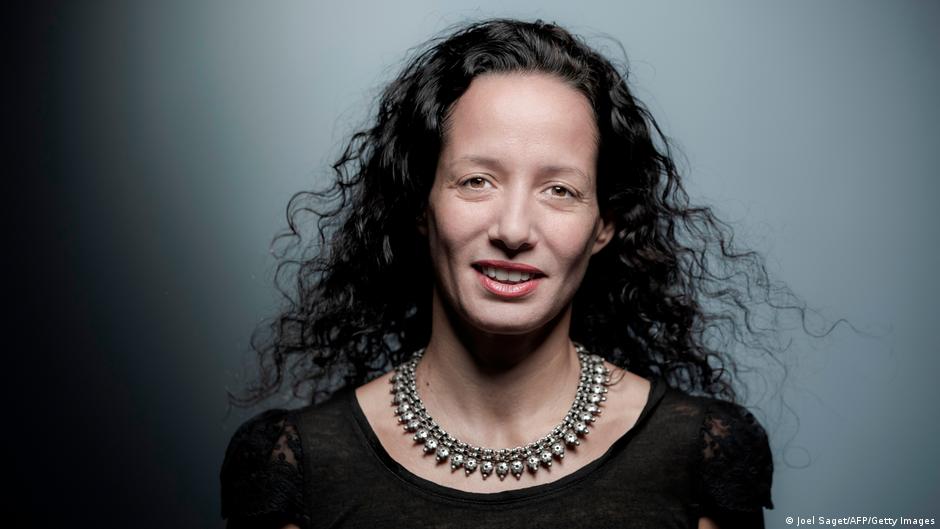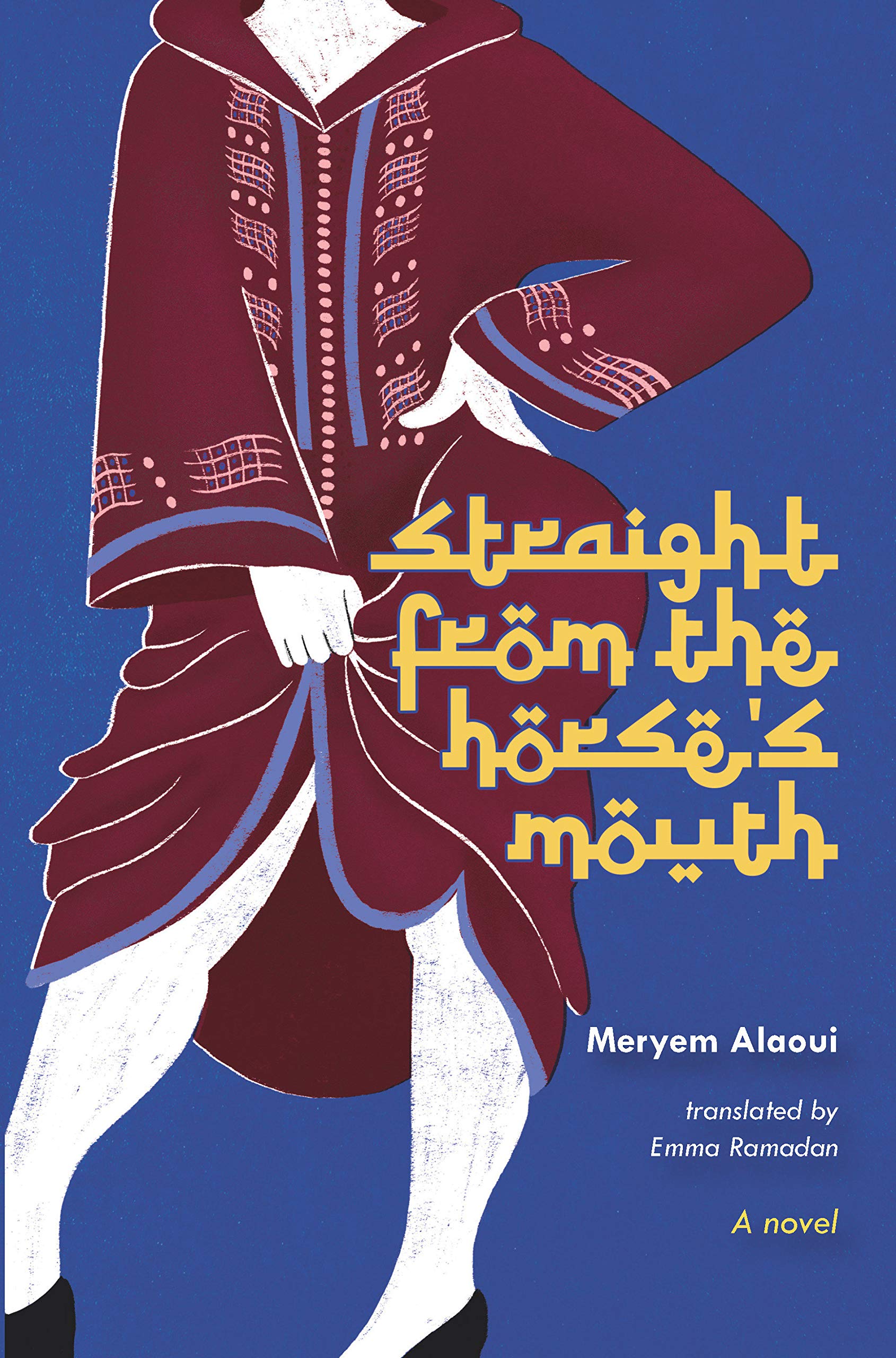A fiercely enjoyable feminist fairytale

In 2003, first-time actress Najat Bensalem starred in a film written and directed by Jacques Doillon. She played the titular role of Raja, a nineteen-year-old servant and part-time sex worker who – in tired and predictable fashion – becomes the love interest of her employer, a wealthy, fifty-something Frenchman.
Meryem Alaoui’s debut novel Straight from the Horse’s Mouth seems to play not only with tropes from this French film, but also with moments from the life of its young Moroccan star. The novel, longlisted for the 2018 Goncourt as La vérité sort de la bouche du cheval, has now been released in a joyful, conversational English translation by Emma Ramadan.
The title, like the novel, is both serious and playful. It tells us the narrative doesn’t come from an outsider, but rather straight from the fictional sex-worker-turned-actress Jmiaa Bent Larbi. But also, Jmiaa nicknames the filmmaker in her book “Horse Mouth”. So the film direction she gets also comes straight from 'the horse's mouth'.
From struggling to stardom
As a teenager, the real Najat Bensalem eked out a living by wrestling with customers in Marrakesh’s famous Jemaa al-Fnaa Square. But after her work in Raja, she won a prestigious Marcello Mastroianni Award at the Venice Film Festival. In an apparent echo, the fictional Jmiaa Bent Larbi goes from eking out a living as a sex worker in Casablanca to winning an acting award at a festival in the United States.
After Bensalem’s promising debut, she was unfortunately frozen out of the Moroccan film industry. More than a decade later, she got to tell her story, after a fashion, in Abdellah El Jaouhary’s documentary Raja Bent El Mellah, which came out in 2015. The film, which was shot over several years, follows Bensalem as she sells single cigarettes and recalls the brief joy of her acting career.

Alaoui’s book is most definitely not a documentary. Instead of a sobering story about the difficulties of sex work or class and social exclusion, we get a fiercely enjoyable feminist fairytale.
The story belongs entirely to the electric and funny Jmiaa, who can be selfish and short-tempered, but is also generous, fun, and larger-than-life. Jmiaa is either writing or speaking her story, from 2010-2018, to an unnamed audience. She is not ashamed of her life as a sex worker, and while she doesn’t sugar coat it, neither does she ask for our pity. All she asks is that we listen.
Like Najat Bensalem’s story, Jmiaa’s unfolds over many years. The novel opens in 2010, shortly before the uprisings that will affect many lives in the Maghreb. Jmiaa, however, pays them hardly any attention.
The eve of the Arab Spring
When the novel opens, Jmiaa is no teenager. She’s a thirty-four-year-old sex worker with a seven-year-old daughter, living in a small room that she rents from her pimp, Houcine. Her ne’er-do-well husband Hamid has run off to Spain, although Jmiaa still supports him with regular remittances. Her mother, whom she just calls “Mouy”, or Ma, is in the village of Berrechid, and doesn’t know what her daughter does for a living.
Deposed Tunisian president Ben Ali does make a brief appearance. But Jmiaa is less concerned with collective uprising than she is with getting through the day, making rent, and experiencing a few small pleasures.
The earth-shattering event of Jmiaa’s life does come in 2011, but it’s not public protest. Instead, it’s when a neighbour comes up to tell her that a Moroccan-Dutch filmmaker wants to hear her story. The filmmaker (“Horse Mouth”) is writing a script that will star a sex worker, and she needs to ask about a few real-life details. The two women spend some pleasant nights together, downing Speciales and driving around the neighbourhood as Jmiaa tells stories about her pimp Houcine, her lover Bouchaib, her neighbour Okaicha, and her fellow sex workers.
Horse Mouth pays for the information, and then she disappears back to the Netherlands, promising to return once she’s secured funding. Then Jmiaa’s life takes a sharp turn for the worse. She’s struck by a motorcycle, her leg is badly broken, and her mother comes to Casablanca, where she discovers how Jmiaa’s been earning a living. Without a social safety net, Jmiaa finds herself unable to work, in severe pain, and increasingly dependent on pills. Without her friend Samira, Jmiaa would not have made it through this period.
When Horse Mouth finally comes back with funding for the film, Jmiaa is initially not pleased to see her, and refuses to meet. But Horse Mouth insists, and she makes her way in through Samira. When she explains that she’s determined to have Jmiaa star in her film, everything changes.
Making a feature film isn’t easy for Jmiaa. She hasn’t been a regular reader, she isn’t used to memorising lines, and the strict daily schedules cramp her personal style. But while the narrative finds humour in the culture clash between Jmiaa and the jet-setting film world, it avoids winking at the reader or having fun at Jmiaa’s expense.
The freedom of the fantastic
In 2013, there is an even bigger culture clash when Jmiaa flies to the U.S. for a film-festival debut. She makes her way surprisingly well, and she’s none too worried about the language barrier. After all, she says, “after a few drinks, you start to understand what people are saying.” When she appears on stage to accept an award, Jmiaa cups a hand over her mouth and gives a triumphant, paragraph-long ululation.
After that, the novel fast-forwards five years, when our protagonist is 42 and her daughter fifteen. Instead of spoiling the novel’s wonderful ending, we’ll return to Najat Bensalem, who finally got to return to the red carpet at the 2016 Marrakesh International Film Festival. She found both sympathy and mockery, and some criticised her supposedly too-casual outfit. Bensalem later explained she was wearing medical-support leggings. She, like Jmiaa, had broken her leg.
According to Morocco World News, Bensalem told journalist Khouloud Sajid: “Tonight, I’ll be on the red carpet. At 5 a.m., I have to be in the retail market to buy vegetables that I’ll sell, and by the end of the day, I’ll go to Jemaa El Fna to sell cigarettes. I always dream of the red carpet, but I stay realistic.”
Fortunately, Straight from the Horse’s Mouth has no such obligation to stay realistic. While Alaoui may not herself have been a sex worker in Casablanca, she manages to lift readers out of the depressing realms of respectability and realism, into a celebration of stories and joy. This reality may not be realistic, but it’s something to aim at.
Marcia Lynx Qualey
© Qantara.de 2021
